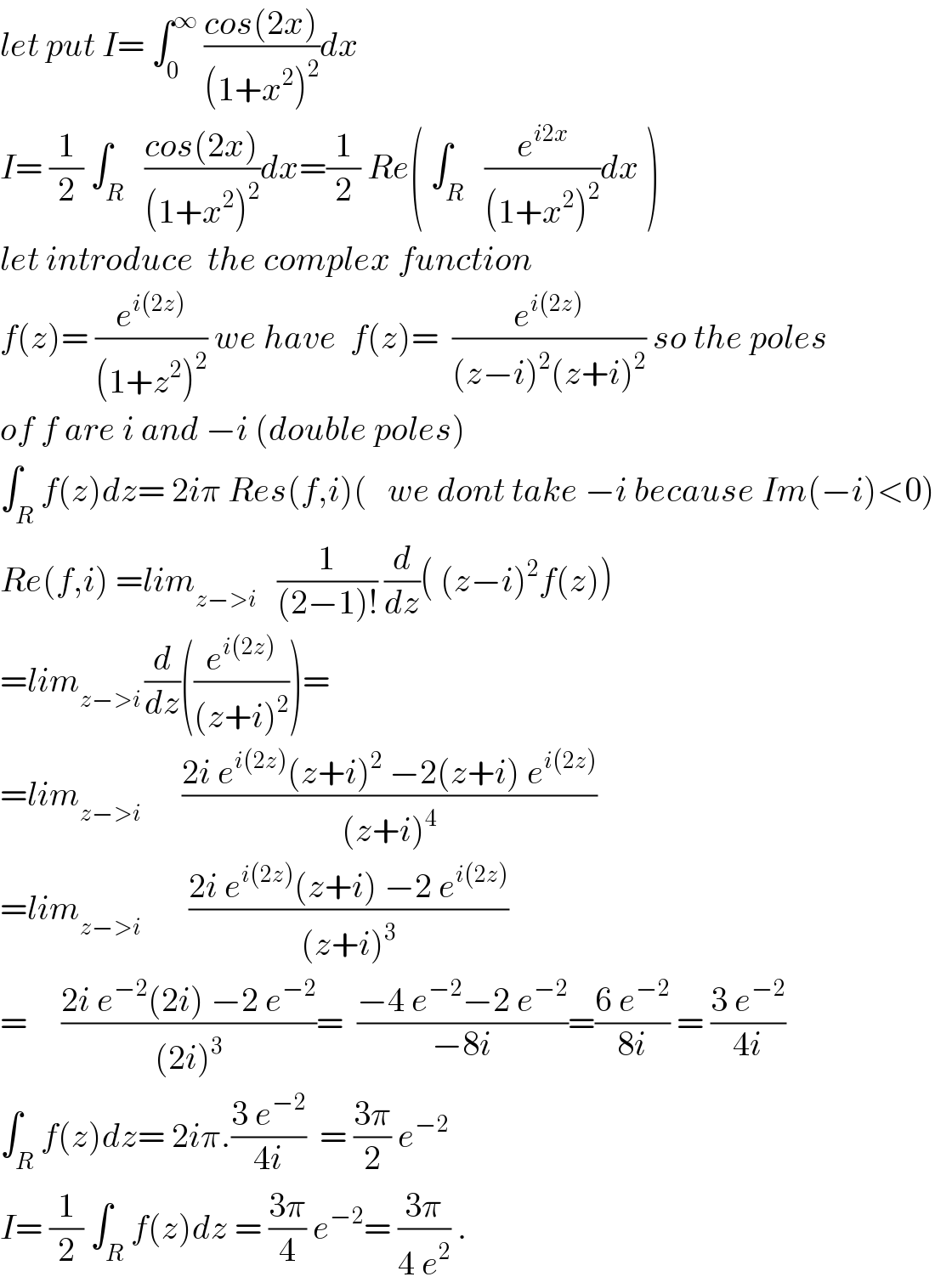Question Number 27619 by abdo imad last updated on 11/Jan/18

$${find}\:{the}\:{value}\:{of}\:\int_{\mathrm{0}} ^{\infty} \:\frac{{cos}\left(\mathrm{2}{x}\right)}{\left(\mathrm{1}+{x}^{\mathrm{2}} \right)^{\mathrm{2}} }{dx}. \\ $$
Commented by abdo imad last updated on 12/Jan/18

$${let}\:{put}\:{I}=\:\int_{\mathrm{0}} ^{\infty} \:\frac{{cos}\left(\mathrm{2}{x}\right)}{\left(\mathrm{1}+{x}^{\mathrm{2}} \right)^{\mathrm{2}} }{dx} \\ $$$${I}=\:\frac{\mathrm{1}}{\mathrm{2}}\:\int_{{R}} \:\:\frac{{cos}\left(\mathrm{2}{x}\right)}{\left(\mathrm{1}+{x}^{\mathrm{2}} \right)^{\mathrm{2}} }{dx}=\frac{\mathrm{1}}{\mathrm{2}}\:{Re}\left(\:\int_{{R}} \:\:\frac{{e}^{{i}\mathrm{2}{x}} }{\left(\mathrm{1}+{x}^{\mathrm{2}} \right)^{\mathrm{2}} }{dx}\:\right) \\ $$$${let}\:{introduce}\:\:{the}\:{complex}\:{function} \\ $$$${f}\left({z}\right)=\:\frac{{e}^{{i}\left(\mathrm{2}{z}\right)} }{\left(\mathrm{1}+{z}^{\mathrm{2}} \right)^{\mathrm{2}} }\:{we}\:{have}\:\:{f}\left({z}\right)=\:\:\frac{{e}^{{i}\left(\mathrm{2}{z}\right)} }{\left({z}−{i}\right)^{\mathrm{2}} \left({z}+{i}\right)^{\mathrm{2}} }\:{so}\:{the}\:{poles} \\ $$$${of}\:{f}\:{are}\:{i}\:{and}\:−{i}\:\left({double}\:{poles}\right) \\ $$$$\int_{{R}} {f}\left({z}\right){dz}=\:\mathrm{2}{i}\pi\:{Res}\left({f},{i}\right)\left(\:\:\:{we}\:{dont}\:{take}\:−{i}\:{because}\:{Im}\left(−{i}\right)<\mathrm{0}\right) \\ $$$${Re}\left({f},{i}\right)\:={lim}_{{z}−>{i}} \:\:\:\frac{\mathrm{1}}{\left(\mathrm{2}−\mathrm{1}\right)!}\:\frac{{d}}{{dz}}\left(\:\left({z}−{i}\right)^{\mathrm{2}} {f}\left({z}\right)\right) \\ $$$$={lim}_{{z}−>{i}\:} \frac{{d}}{{dz}}\left(\frac{{e}^{{i}\left(\mathrm{2}{z}\right)} }{\left({z}+{i}\right)^{\mathrm{2}} }\right)= \\ $$$$={lim}_{{z}−>{i}} \:\:\:\:\:\:\frac{\mathrm{2}{i}\:{e}^{{i}\left(\mathrm{2}{z}\right)} \left({z}+{i}\right)^{\mathrm{2}} \:−\mathrm{2}\left({z}+{i}\right)\:{e}^{{i}\left(\mathrm{2}{z}\right)} }{\left({z}+{i}\right)^{\mathrm{4}} } \\ $$$$={lim}_{{z}−>{i}} \:\:\:\:\:\:\:\frac{\mathrm{2}{i}\:{e}^{{i}\left(\mathrm{2}{z}\right)} \left({z}+{i}\right)\:−\mathrm{2}\:{e}^{{i}\left(\mathrm{2}{z}\right)} }{\left({z}+{i}\right)^{\mathrm{3}} } \\ $$$$=\:\:\:\:\:\frac{\mathrm{2}{i}\:{e}^{−\mathrm{2}} \left(\mathrm{2}{i}\right)\:−\mathrm{2}\:{e}^{−\mathrm{2}} }{\left(\mathrm{2}{i}\right)^{\mathrm{3}} }=\:\:\frac{−\mathrm{4}\:{e}^{−\mathrm{2}} −\mathrm{2}\:{e}^{−\mathrm{2}} }{−\mathrm{8}{i}}=\frac{\mathrm{6}\:{e}^{−\mathrm{2}} }{\mathrm{8}{i}}\:=\:\frac{\mathrm{3}\:{e}^{−\mathrm{2}} }{\mathrm{4}{i}} \\ $$$$\int_{{R}} {f}\left({z}\right){dz}=\:\mathrm{2}{i}\pi.\frac{\mathrm{3}\:{e}^{−\mathrm{2}} }{\mathrm{4}{i}}\:\:=\:\frac{\mathrm{3}\pi}{\mathrm{2}}\:{e}^{−\mathrm{2}} \\ $$$${I}=\:\frac{\mathrm{1}}{\mathrm{2}}\:\int_{{R}} ^{} {f}\left({z}\right){dz}\:=\:\frac{\mathrm{3}\pi}{\mathrm{4}}\:{e}^{−\mathrm{2}} =\:\frac{\mathrm{3}\pi}{\mathrm{4}\:{e}^{\mathrm{2}} }\:. \\ $$
